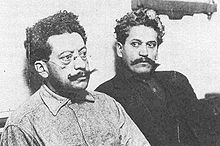- Ricardo Flores Magón
-
Ricardo Flores Magón 
Brothers Ricardo (left) and Enrique Flores Magón (right) at the Los Angeles County Jail, 1917.Born September 16, 1874
San Antonio Eloxochitlán, OaxacaDied November 21, 1922 (aged 48)
Kansas, United StatesNationality Mexican Occupation Journalist, activist, revolutionary, theorist Known for Involvement in the Mexican Revolution, introducing anarchism to Mexico Cipriano Ricardo Flores Magón (September 16, 1874 — November 21, 1922) was a noted Mexican anarchist and social reform activist.[1] His brothers Enrique and Jesús were also active in politics. Followers of the Magón brothers were known as Magonistas.
Contents
Biography
He was born on Mexican Independence Day, in San Antonio Eloxochitlán, Oaxaca, an indigenous Mazatec community. His father, Teodoro Flores, was likely an Indian whereas his mother, Margarita Magón is described as a Mestiza. The couple met each other in 1863 during the Siege of Puebla when both were carrying munitions to the Mexican troops.
Magón explored the writings and ideas of many early anarchists, such as Mikhail Bakunin and Pierre-Joseph Proudhon, but was also influenced by anarchist contemporaries Élisée Reclus, Charles Malato, Errico Malatesta, Anselmo Lorenzo, Emma Goldman, and Fernando Tarrida del Mármol. He was most influenced by Peter Kropotkin. He also read from the works of Karl Marx and Henrik Ibsen.
He was one of the major thinkers of the Mexican Revolution and the Mexican revolutionary movement in the Partido Liberal Mexicano. Flores Magón organised with the Wobblies (IWW) and edited the Mexican anarchist newspaper Regeneración, which aroused the workers against the dictatorship of Porfirio Díaz.
Kropotkin's The Conquest of Bread, which Flores Magón considered a kind of anarchist bible, served as basis for the short-lived revolutionary communes in Baja California during the "Magonista" Revolt of 1911. From 1904, Magón remained in the USA. Half this period he was in prison. His last arrest was in 1918, when he received a 20-year sentence for "obstructing the war effort", a violation of the Espionage Act of 1917. The Wilson administration conducted what were called the Palmer Raids, a wholesale crackdown on war dissidents and leftists that also swept up notable socialists such as Eugene V. Debs. He died at Leavenworth Penitentiary in Kansas.
The cause of Flores Magón's death has been disputed. Some believe that he was deliberately murdered by prison guards. Others contend that he died as a result of deteriorating health caused by his long imprisonment, possibly exacerbated by medical neglect by Leavenworth Penitentiary officials and staff. Flores Magón wrote several letters to friends complaining of debilitating health problems and of what he perceived to be purposeful neglect by the prison staff.[2] Yet others have contended that he likely died while in prison due to natural causes.[3]
Legacy
Flores Magón's movement fired the imagination of both American and Mexican anarchists. In 1945, his remains were repatriated to Mexico and were interred in the Rotonda de los Hombres Ilustres in Mexico City. In Mexico, the Flores Magón brothers are considered left-wing political icons nearly as notable as Emiliano Zapata; numerous streets, public schools, towns and neighborhoods are named for them.
In 1997, an organization of indigenous peoples of Mexico in the state of Oaxaca formed the Popular Indigenous Council of Oaxaca "Ricardo Flores Magón" (Consejo Indígena Popular de Oaxaca "Ricardo Flores Magón", or CIPO-RFM), based on the philosophy of Magón.[4]
References
- ^ INAFED. "Teotitlán de Flores Magón". Enciclopedia de los Municipios de México. http://www.e-local.gob.mx/work/templates/enciclo/oaxaca/municipios/20545a.htm. Retrieved 2008-10-24.. However, he is invariably known to posterity as "Ricardo".
- ^ Rivera, Librado (1922-11-25). "Letter to Raúl Palma". http://dwardmac.pitzer.edu/Anarchist_Archives/bright/magon/history/deathletter.html. Retrieved 2007-11-30.
- ^ "FLORES MAGÓN, RICARDO". Handbook of Texas Online. Texas State Historical Association. 2001-06-06. http://www.www.tshaonline.org/handbook/online/articles/FF/ffl28.html. Retrieved 2007-11-30.
- ^ Kolhatkar, Sonali (2005-12-02). "An Interview with Raúl Gatica". Z Magazine Online. ZNET. http://zmagsite.zmag.org/May2006/kolhatkar0506.html.
Further reading
- Flores Magón, Ricardo; Chaz Bufe and Mitchell Cowen Verter (eds.) (2005). Dreams of Freedom: A Ricardo Flores Magón Reader. Stirling: AK Press. ISBN 9781904859246.
- Albro, Ward S. (1992). Always a Rebel: Ricardo Flores Magón and the Mexican Revolution. Texas Christian University Press. ISBN 9780875652818.
- MacLachlan, Colin (1991). Anarchism and the Mexican Revolution: The Political Trials of Ricardo Flores Magón in the United States. University of California Press. ISBN 9780520071179.
- Hart, John M. (1987). Anarchism and the Mexican Working Class, 1860-1931. University of Texas Press. ISBN 9780292704008.
- Lucas, Jeffrey Kent (2010). The Rightward Drift of Mexico’s Former Revolutionaries: The Case of Antonio Díaz Soto y Gama. Edwin Mellen Press. ISBN 9780773436657.
External links
- Ricardo Flores Magón entry at the Anarchy Archives
- Complete Works (mostly in Spanish)
- Ricardo Flores Magón in English and Spanish
- Death of a Political Prisoner: Revisiting the Case of Ricardo Flores Magón
- Historic Sites of Magón's travels in exile, including addresses in Laredo, San Antonio, Saint Louis, El Paso, Los Angeles, Tucson, Tombstone, and prisons in Yuma, Florence (AZ), McNeil Island (WA), and Leavenworth (KA) (site in progress)
Mexican Revolution Background Important people Porfirio Díaz • Francisco I. Madero • Victoriano Huerta • Francisco "Pancho" Villa • Venustiano Carranza • Emiliano Zapata • Álvaro Obregón • Pascual Orozco • Plutarco Elías Calles • Lázaro Cárdenas • José Yves Limantour • Ramón Corral • Francisco León de la Barra • Félix Díaz Velasco • Bernardo Reyes • Eufemio Zapata • Manuel Palafox • Genovevo de la OPlans Plan of San Luis Potosí • Plan of Ayala • Plan of Guadalupe • Plan of Agua Prieta • Plan of San DiegoPolitical developments Treaty of Ciudad Juárez • Decena trágica • Convention of Aguascalientes • Querétaro Constitutional Convention • United States involvement (Formations)Legacy Other Categories:- 1874 births
- 1922 deaths
- Mexican anarchists
- Mexican atheists
- Mexican journalists
- Mexican rebels
- Mexican revolutionaries
- Anarchist communists
- People from Oaxaca
- People of the Mexican Revolution
- History of Baja California
- Industrial Workers of the World members
- Mexican people who died in prison custody
- Mexican people imprisoned abroad
- Prisoners who died in United States federal government detention
Wikimedia Foundation. 2010.


